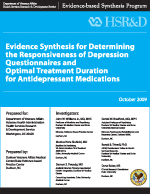
|
Investigators: John W Williams, Jr, MD, MHS, Monica Nora Slubicki, MD,Damon S Tweedy, MD,Daniel W Bradford, MD, MPH, Ranak B Trivedi, PhD, and Dana Baker, MS. Durham VA Medical Center, Durham, NC Duke University, Durham, NC Evidence-Based Practice Center, Durham, NC Duke University Medical Center, Durham, NC Psychosocial Rehabilitation and Recovery Center, Durham VAMC, Durham, NC Washington (DC): Department of Veterans Affairs; October 2009. |
Download PDF: Complete Report, Executive Summary, Report, Appendices
According to projections from the World Health Organization, depression will be the second leading cause of disability in the developed world by 2020. Primary care clinicians care for approximately two thirds of depressed individuals. A variety of strategies have been tested to improve patient outcomes, with integrated care models having emerged as both clinically-and cost-effective. Patients randomized to integrated care are more likely to receive an adequate trial of antidepressants and/or empirically based psychotherapies and are approximately twice as likely to respond to treatment compared to usual care.
To inform recommendations for clinical guidelines and potential performance measures, this evidence synthesis evaluates the responsiveness of depression questionnaires feasible for primary care settings and data from randomized trials that examine the effects on continued antidepressant use to prevent relapse or recurrence.
The systematic literature review addressed the following key questions:
According to projections from the World Health Organization, depression will be the second leading cause of disability in the developed world by 2020. Primary care clinicians care for approximately two thirds of depressed individuals. In 2000, the U.S. economic burden of depressive disorders was estimated to be 83.1 billion dollars. This included 31% direct medical costs, 7% suicide-related mortality costs, and 62% workplace costs. A variety of strategies have been tested to improve patient outcomes. Among these, integrated care models have emerged as both effective and cost effective. A recent systematic review identifies symptom monitoring as a key element of these integrated care models. However, the review did not identify the standardized depression scales that are responsive to clinically important change.
A separate but important issue raised by Veterans Administration (VA) Stakeholders is how long to continue antidepressant medication for patients who respond to acute phase treatment. Clinical guidelines recommend continuation treatment for 4-6 months for uncomplicated major depression and some national performance measures are linked to these guidelines. However, clinical guidelines for longer-term maintenance phase treatment are more variable and performance indicators (e.g., Healthcare Effectiveness Data and Information Set, HEDIS) do not address maintenance phase treatment. A better understanding of the evidence for long-term treatment efficacy with antidepressants would inform guidelines and performance measurement.
Measuring Changes in Depression and Assessing Optimal Treatment: New Evidence Syntheses (Management eBrief)